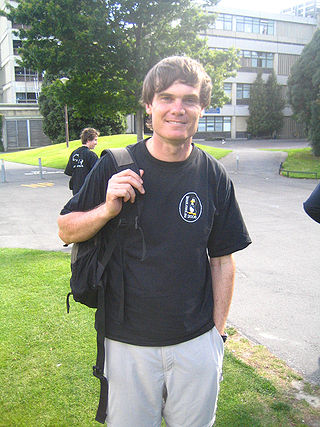
Andrew "Tridge" Tridgell is an Australian computer programmer. He is the author of and a contributor to the Samba file server, and co-inventor of the rsync algorithm.

Linus Benedict Torvalds is a Finnish-American software engineer who is the creator and lead developer of the Linux kernel. He also created the distributed version control system Git.
XFS is a high-performance 64-bit journaling file system created by Silicon Graphics, Inc (SGI) in 1993. It was the default file system in SGI's IRIX operating system starting with its version 5.3. XFS was ported to the Linux kernel in 2001; as of June 2014, XFS is supported by most Linux distributions; Red Hat Enterprise Linux uses it as its default file system.
The Filesystem Hierarchy Standard (FHS) is a reference describing the conventions used for the layout of Unix-like systems. It has been made popular by its use in Linux distributions, but it is used by other Unix-like systems as well. It is maintained by the Linux Foundation. The latest version is 3.0, released on 3 June 2015.

Linux Australia is the national, Australian Free and Open Source Software Community organisation. It was founded in 1997 and formally incorporated in New South Wales as a non-profit organisation in 1999. Linux Australia aims to represent Australian Free and Open Source Software communities and to support and collaborate with related groups, including Linux User Groups in Australia.

linux.conf.au is Australasia's regional Linux and Open Source conference. It is a roaming conference, held in a different Australian or New Zealand city every year, coordinated by Linux Australia and organised by local volunteers.

Git is a distributed version control system that tracks versions of files. It is often used to control source code by programmers collaboratively developing software.
AppImage is an open-source format for distributing portable software on Linux. It aims to allow the installation of binary software independently of specific Linux distributions, a concept often referred to as upstream packaging. As a result, one AppImage can be installed and run across Ubuntu, Arch Linux, and Red Hat Enterprise Linux without needing to use different files. It aims to be a format that is self-contained, rootless, and independent of the underlying Linux distribution.
A kernel is a component of a computer operating system. A comparison of system kernels can provide insight into the design and architectural choices made by the developers of particular operating systems.
Squashfs is a compressed read-only file system for Linux. Squashfs compresses files, inodes and directories, and supports block sizes from 4 KiB up to 1 MiB for greater compression. Several compression algorithms are supported. Squashfs is also the name of free software, licensed under the GPL, for accessing Squashfs filesystems.

Wireless network cards for computers require control software to make them function. This is a list of the status of some open-source drivers for 802.11 wireless network cards.
ext4 is a journaling file system for Linux, developed as the successor to ext3.

NTFS-3G is an open-source cross-platform implementation of the Microsoft Windows NTFS file system with read/write support. NTFS-3G often uses the FUSE file system interface, so it can run unmodified on many different operating systems. It is runnable on Linux, FreeBSD, NetBSD, OpenSolaris, illumos, BeOS, QNX, WinCE, Nucleus, VxWorks, Haiku, MorphOS, Minix, macOS and OpenBSD. It is licensed under the GNU General Public License. It is a partial fork of ntfsprogs and is under active maintenance and development.
aufs implements a union mount for Linux file systems. The name originally stood for AnotherUnionFS until version 2.

Tux is a penguin character and the official brand character of the Linux kernel. Originally created as an entry to a Linux logo competition, Tux is the most commonly used icon for Linux, although different Linux distributions depict Tux in various styles. The character is used in many other Linux programs and as a general symbol of Linux.

The Linux kernel is a free and open-source, UNIX-like kernel that is used in many computer systems worldwide. The kernel was created by Linus Torvalds in 1991 and soon after was adopted as the kernel for the GNU operating system (OS) which was created to be a free replacement for Unix.
"Everything is a file" is an idea that Unix, and its derivatives, handle input/output to and from resources such as documents, hard-drives, modems, keyboards, printers and even some inter-process and network communications as simple streams of bytes exposed through the filesystem name space. Exceptions include semaphores, processes and threads.
cgroups is a Linux kernel feature that limits, accounts for, and isolates the resource usage of a collection of processes.
Bcachefs is a copy-on-write (COW) file system for Linux-based operating systems. Its primary developer, Kent Overstreet, first announced it in 2015, and it was added to the Linux kernel beginning with 6.7. It is intended to compete with the modern features of ZFS or Btrfs, and the speed and performance of ext4 or XFS.
This article documents the version history of the Linux kernel.








